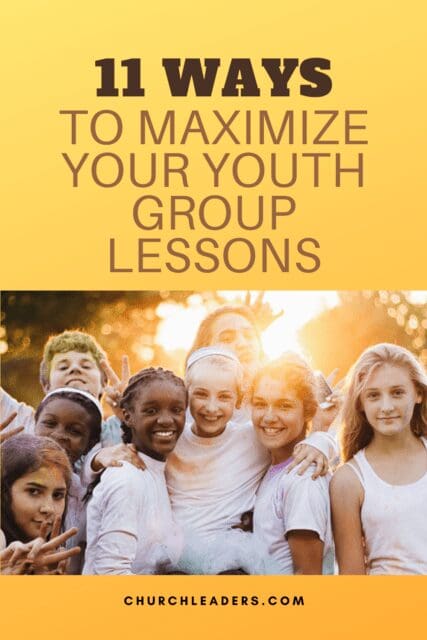Do your youth group lessons often seem longer than teenagers’ attention spans? If you’re like most youth leaders, the list of valuable messages you want to impart to kids keeps growing longer, while their interest keeps shrinking. Whether you’re meeting in-person or online, you have many opportunities to make a big impact on young people’s faith and lives. To help, we’ve collected 11 must-have tips from experts in the youth ministry field.
Use these 11 reminders to maximize your youth group lessons:
1. Keep it relevant.
No matter the topic, find a way to connect it to young people’s lives. Jesus was able to reach people because he asked hurting people about themselves and then listened to their responses. He modeled how we are to care for others. When youth group lessons connect to kids’ personal experiences, they’re better able to internalize them. In other words, make the lesson about kids. When they feel an emotion connected to what you’re teaching, the key points will stick with them long after the meeting is over.
2. Know your objective.
This may sound obvious, but you need to know what each youth group lesson is meant to achieve. Clearly defined objectives give you a goal to work toward with every aspect of a study or message. Without learning objectives, your words might wander and your time will fly by. Going off script is still okay if an unexpected learning moment presents itself. You just need a focus and a purpose from the beginning to hold your youth group lessons together.
3. Keep your listeners in mind.
Just because you’re talking to teenagers doesn’t mean you need to dumb down your youth group lessons or ignore good exegesis. Just remember to be a prophet for your people as you unpack Scripture. Youth group lessons require lots of clear, memorable, and applicable teaching. Even more importantly, the lessons need space so teenagers can unpack what they’ve just heard.
4. Always keep Christ—and the gospel—at the center.
No matter the topic or style of your youth group lessons, Jesus needs to be the main “attraction.” If you preach from the Old Testament, for example, draw the big red line to what was to come, to what Jesus would do. Connect God, Jesus, and the Holy Spirit, making sure listeners know these Three are One.
5. Share your discoveries with youth.
When God lights a fire under you during your own devotional study, it’s okay to let that bleed over to your youth group lessons. At least every now and again, you should read something in the Bible that hits you so hard, you just have to share it with the teenagers you speak to on a regular basis.
6. Ask a variety of questions.
Mix things up in your youth group lessons by using open-ended questions, directed questions, focused questions, follow-up questions, starter questions, awareness questions, divergent questions, “head” and “heart” questions, and surprising (not obvious) questions. In between them all, allow times of silence too.
7. Encourage wonder.
When teenagers wonder and question, they’re encouraged to continue exploring God’s Word on their own. So respect inquiries, and make sure everyone listens to whomever is talking. Be sure to express excitement when students discover or understand something from your youth group lessons. When someone shares insights, have group members commit to either praise God or offer words of encouragement.
8. Inspire kids—and encourage them to inspire others.
In every youth group lesson, tell stories of changed lives. Have teens share stories of how the gospel changed their lives or how God is using them to change the lives of their friends through the gospel. Every youth group meeting should have at least one story of how the gospel is changing lives.
9. Be flexible and have fun.
During your youth group lessons, remember to let things breathe. Change things up occasionally; for example, let kids connect with God in silence or in creativity. The school year is unpredictable, and life is unpredictable—especially lately. Staying flexible helps you respond and adjust in the moment.
10. Issue a challenge.
At the end of each youth group lesson, challenge teenagers to follow through on one idea or action step. During the week, text kids (or have your teen leaders send texts) with a brief reminder about the challenge. If they take it or try it, great. If they alter it somehow, wonderful! If they don’t act, at least you gave them the option. Maybe they’ll store away the idea for later.
11. Never stop praying!
Prayer is a powerful part of every youth group lesson. Prayer helps you prepare, breaks up the hardened “unplowed ground” of teenagers’ hearts, and helps kids retain and apply what they hear. Incorporate prayer into every lesson, and also have kids pray for one another. Amped-up prayers lead to amped-up teenagers who are excited about their faith!


